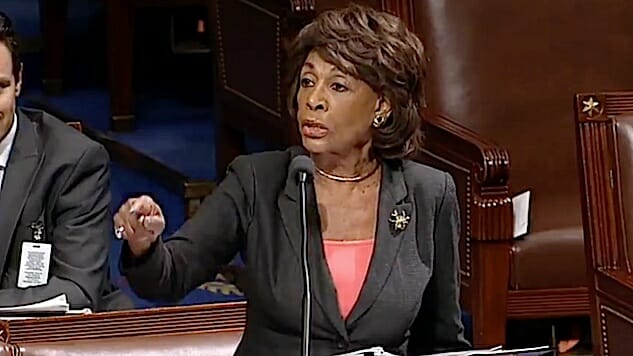Environmental Groups Call For Reforms To End Ex-Im Fossil Fuel Funding
Photo courtesy of Getty
House Financial Services Chairwoman Maxine Waters (D-CA) abruptly pulled a bill in late June that would reauthorize the Export-Import Bank of The United States (Ex-Im). The move came amid defiance from her own caucus—the first time she has faced resistance from members of the committee since she became Chairwomen in January.
H.R 3407, a bipartisan bill sponsored by Waters and Patrick McHenry (R-N.C), would renew Ex-Im, provide funding for another seven years and gradually increase its $135 billion portfolio cap to $175 billion. The organization’s congressional authorization lapses in September, at which point it will be unable to engage in new business transactions.
The delay was hailed as a victory by environmental groups pushing for amendments that would limit funding of fossil fuel development and other environmentally damaging projects. “Every coal power plant the Export-Import Bank props up brings us that much closer to climate catastrophe. This bank needs fundamental reform now,” said Brett Hartl, government affairs director at the Center for Biodiversity.
Ex-Im is a wholly government-owned bank that helps facilitate US exports by providing loans at below-market rates. For example, if an airline in Germany wants to buy a 787 from Boeing, Ex-Im will finance the transaction at a far more favorable rate than would be available on the private market—political and currency risks can make commercial financing for export transactions prohibitively expensive, if not impossible, to acquire.
Ex-Im was initially established by Franklin Delano Roosevelt in 1934 and played a vital role in financing many of the landmark 20th-century projects that helped propagate America’s influence and cement its role as a global superpower. The Bank was instrumental in the construction of the Burma Road, rebuilding post-World War II Europe and providing the first credit to post-Soviet nations.
Proponents of the Bank argue that it helps create jobs and keep America competitive on the global stage by strengthening manufacturers’ ability to export to new markets and keep up with global competition. It’s critics denounce the bank as an egregious example of corporate welfare and crony capitalism (it has been dubbed the “Boeing Bank” because of the vast subsidies it grants that particular corporation).
-

-

-

-

-

-

-

-

-

-

-

-

-

-

-

-

-

-

-

-

-

-

-

-

-

-

-

-

-

-

-

-

-

-

-

-

-

-

-

-








































